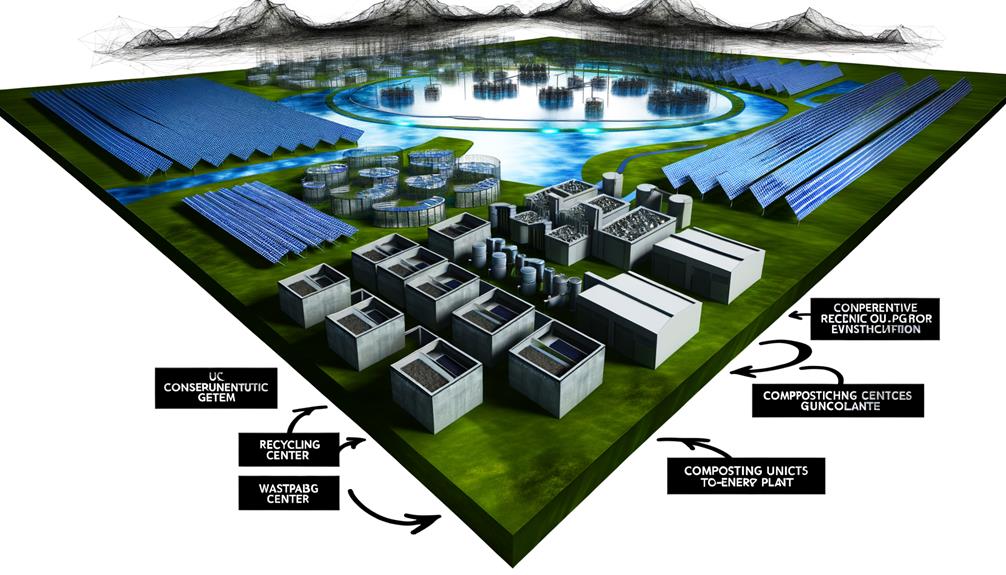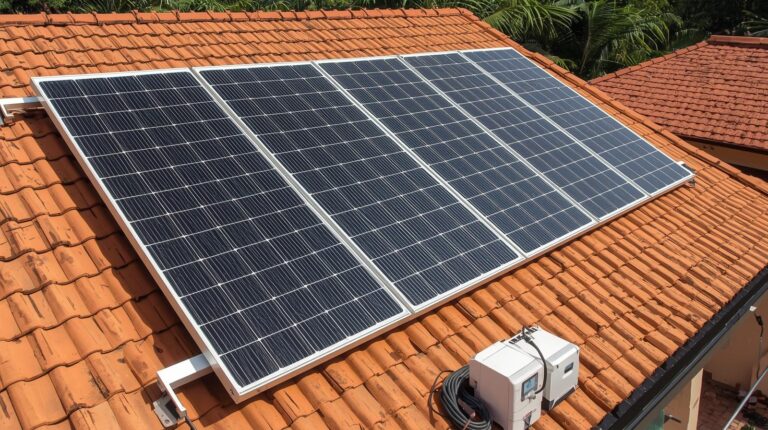Are you tired of the never-ending cycle of waste generation and its negative impact on the environment? Well, buckle up because sustainable waste management in solar grid systems is here to revolutionize the game.
With the help of cutting-edge solar technology, waste management is no longer just a burden, but an opportunity to create a greener and cleaner future.
But how exactly does it work? And what are the benefits of incorporating solar power into waste management strategies?
In this discussion, we will explore the importance of waste management in solar systems, the key environmental impacts of off-grid solar power, sustainable practices for waste reduction, recycling and repurposing in solar grid systems, and future innovations in waste management for solar power.
So, get ready to discover a whole new world of sustainable waste management possibilities!
Key Takeaways
- Proper waste management in solar systems is crucial for minimizing environmental impact and reducing the need for new panels through recycling.
- Off-grid solar power offers sustainable solutions for remote areas and reduces reliance on traditional waste management methods with lower greenhouse gas emissions.
- Solar-powered waste management systems promote environmental stewardship, are more energy-efficient, and have lower greenhouse gas emissions.
- Recycling and repurposing solar panels not only recover valuable materials and reduce landfill waste but also create economic opportunities and reduce the need for virgin materials.
Importance of Waste Management in Solar Systems
Proper waste management in solar systems is crucial for minimizing environmental impact, promoting responsible use and disposal of solar technology, and ensuring the long-term sustainability of this renewable energy source. Solar panel waste can have significant environmental consequences if not managed properly.
By implementing effective waste management practices, such as reducing the need for new panels through recycling, we can greatly reduce the environmental impact of solar energy. Recovery and recycling of solar panels can help conserve resources and reduce the amount of waste that ends up in landfills.
Additionally, responsible waste management in solar systems can create economic opportunities through recycling and waste-to-energy programs. By prioritizing the proper disposal and recycling of solar panel waste, we can protect the environment, promote sustainability, and contribute to the overall well-being of our planet.
Key Environmental Impacts of Off Grid Solar Power
To fully understand the environmental impact of off-grid solar power, it’s essential to examine its key effects on waste management systems and greenhouse gas emissions. Here are three important environmental impacts of off-grid solar power:
Reduction in reliance on traditional waste management methods:
Off-grid solar power systems provide a renewable energy source that reduces the need for conventional waste management methods. By utilizing solar energy systems, you can significantly reduce the generation of non-renewable energy waste.
Lower greenhouse gas emissions:
Solar-powered waste management systems have lower greenhouse gas emissions compared to traditional methods. This is because solar energy systems produce electricity without burning fossil fuels, which are major contributors to greenhouse gas emissions.
Sustainable solutions for off-grid and remote areas:
Off-grid solar power offers sustainable solutions for waste management in areas that aren’t connected to the grid. These systems can be set up in remote locations, providing a reliable and renewable source of energy while minimizing environmental impacts.
Sustainable Practices for Waste Reduction
Solar-powered waste management systems offer sustainable practices for reducing waste and promoting environmental stewardship. By harnessing solar energy, these systems power waste-to-energy plants, composting facilities, and recycling centers, making the entire waste management process more sustainable.
Compared to traditional methods, solar waste management systems are more energy-efficient and have lower greenhouse gas emissions, resulting in cost savings and reduced environmental impacts. However, there are challenges that need to be addressed, such as initial installation costs, government support, and knowledge gaps.
To further enhance sustainability, it’s crucial to focus on end-of-life management of solar panels. Recycling facilities play a vital role in resource recovery, ensuring the extraction of valuable components and raw materials for future clean energy solutions.
Recycling and Repurposing in Solar Grid Systems
By embracing sustainable practices and focusing on end-of-life management, solar grid systems can contribute to a more environmentally friendly approach to waste management through recycling and repurposing.
Here are three ways in which recycling and repurposing can be implemented in solar grid systems:
- Recycling solar panels: When solar panels reach their end of life, they can be recycled to recover valuable materials such as silicon, glass, and metal. These materials can then be used to manufacture new solar panels or other products, reducing the amount of photovoltaic waste that goes to landfills.
- Repurposing solar technology: Components of solar panels, inverters, and batteries can often be repurposed for other applications. For example, used solar panels can be used for solar water heating or integrated into building materials like windows or roofs.
- Economic benefits: Implementing recycling and repurposing in solar grid systems can create economic opportunities by establishing recycling facilities and fostering a circular economy. Additionally, it reduces the need for virgin materials, leading to cost savings and resource conservation.
Future Innovations in Waste Management for Solar Power
Future innovations in waste management for solar power are poised to revolutionize the industry and significantly enhance the sustainability of solar grid systems.
Advanced recycling techniques are being developed to recover valuable materials from decommissioned solar panels, reducing the need for raw materials and minimizing waste generated by the solar power industry.
Emerging technologies aim to improve the efficiency and environmental performance of solar panel recycling, ensuring that the recycling process itself is sustainable.
Additionally, waste-to-energy processes powered by solar energy are being explored as a way to convert solar waste into usable energy, offering a sustainable solution for managing the waste generated by solar grid systems.
These future innovations pave the way for a circular economy for solar panels, emphasizing the reduction, reuse, and recycling of materials to minimize environmental impact.
| Future Innovations in Waste Management for Solar Power | Benefits |
|---|---|
| Advanced recycling techniques | Recover valuable materials and minimize waste |
| Emerging technologies | Improve recycling efficiency and environmental performance |
| Waste-to-energy processes powered by solar energy | Convert solar waste into usable energy |
| Circular economy for solar panels | Reduce, reuse, and recycle materials to minimize environmental impact |
| Research and investment | Fully realize the potential of solar waste management technologies |
Frequently Asked Questions
How Are Solar Panels Environmentally Sustainable?
Solar panels are environmentally sustainable as they harness renewable energy, reducing reliance on fossil fuels and lowering the carbon footprint. They are energy-efficient, contribute to resource conservation, and support clean energy initiatives, making them eco-friendly and promoting sustainable development.
What Is the Sustainability of Solar System?
Solar energy is sustainable because it offers benefits like reduced carbon emissions, job creation, and energy independence. The government plays a crucial role in promoting solar systems and integrating them with other renewable sources. Challenges exist, but advancements in technology will drive future progress.
Is Solar Panel Waste 300 Times More Toxic Than Nuclear Waste?
Solar panel waste is not 300 times more toxic than nuclear waste. While proper disposal and recycling options are crucial, both types of waste pose potential health risks and environmental impact. Regulatory measures, technological advancements, and public awareness are key to effective end-of-life management.
What Are the Waste Byproducts of Solar Energy?
The waste byproducts of solar energy include end-of-life solar panels and related equipment. Proper recycling options and disposal methods are essential to minimize the environmental impact of these materials.
Material composition and waste management strategies play a crucial role in implementing a circular economy approach. Additionally, repurposing opportunities and adherence to e-waste regulations contribute to resource recovery.
Conclusion
Congratulations! You have successfully explored the importance of sustainable waste management in solar grid systems.
By implementing energy-efficient alternatives such as waste-to-energy plants and recycling centers powered by solar energy, we can minimize environmental impact and promote responsible use of solar technology.
Remember, ‘where there’s a will, there’s a way.’ With government support and expertise, we can overcome challenges and pave the way for a sustainable and economically viable future in solar-powered waste management.
Keep shining bright!




